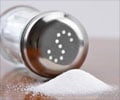Americans eat too much salt, most of it hidden in prepared meals and processed foods, and it is putting them at greater risk for high blood pressure and other serious illnesses, a
Americans eat too much salt, most of it hidden in prepared meals and processed foods, and it is putting them at greater risk for high blood pressure and other serious illnesses, a report published Tuesday said.
On average, Americans consume more than 3,400 milligrams of sodium a day, or around one and a half teaspooons, said the report, which was commissioned by Congress two years ago to try to find a way to reduce sodium intake, which could prevent more than 100,000 deaths a year.Official US guidelines recommend that no more than 2,300 milligrams of salt, or a teaspoon of salt, be consumed each day.
"For 40 years we have known about the relationship between sodium and the development of hypertension and other life-threatening diseases, but we have had virtually no success in cutting back the salt in our diets," said University of Cincinnati professor of medicine Jane Henney, head of the committee that wrote the report.
Indeed, numerous attempts have been made over the years to reduce US sodium consumption but those individual efforts to cut down on salt intake failed repeatedly.
So in 2008, under former President George W. Bush, Congress asked the Institute of Medicine to recommend strategies for reducing sodium intake to no more than the maximum recommendation of a teaspoon a day.
The report recommended that a coordinated approach involving food manufacturers and restaurants be taken to cut back on salt subtly and over time in "a way that goes unnoticed by most consumers as individuals' taste sensors adjust to the lower levels of sodium."
Advertisement
The FDA expects to set up an inter-agency working group on sodium after studying the report's recommendations.
"We are encouraged by the fact that some food manufacturers have already begun or announced their commitment to reduce sodium levels in their products," she said.
But the attempt to improve Americans' health by helping them to cut back on their salt intake was, to the mind of US conservatives, just another example of how the federal government was becoming outsized.
"You eat too much salt, and President Obama is here to save you... I don't think the Founding Fathers had anything like this in mind when they designed a federal government with limited powers," read an editorial in the Washington Examiner.
And the salt production industry dismissed findings that too much salt is no good for you.
"No evidence demonstrates that current salt intake levels lead to worse health outcomes such as more heart attacks or higher cardiovascular mortality," the Salt Institute said.
The Institute of Medicine report stressed that the reduction of salt in foods must be carried out gradually, "with small reductions instituted regularly as part of a carefully monitored process.
"Evidence shows that a decrease in sodium can be accomplished successfully without affecting consumer enjoyment of food products if it is done in a stepwise process that systematically and gradually lowers sodium levels across the food supply," the report said.
A recent study by Columbia University showed that reducing dietary salt by three grams per day -- the equivalent of about 1200 milligrams of sodium -- would result in an 11 percent drop in new heart disease, 13 percent fewer heart attacks, eight percent fewer strokes and four percent fewer deaths.
"Reducing dietary salt is one of those rare interventions that has a huge health benefit and actually saves large amounts of money," the study said.
Source-AFP
SRM











